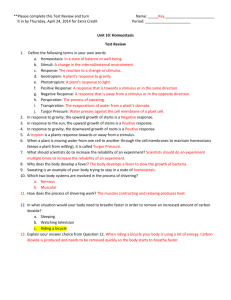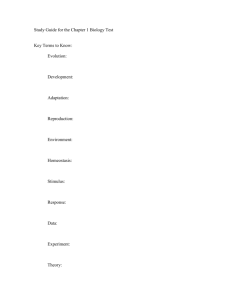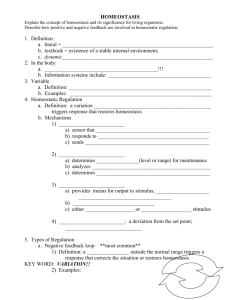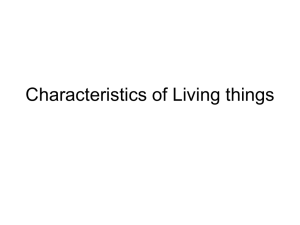Biology 102A
advertisement
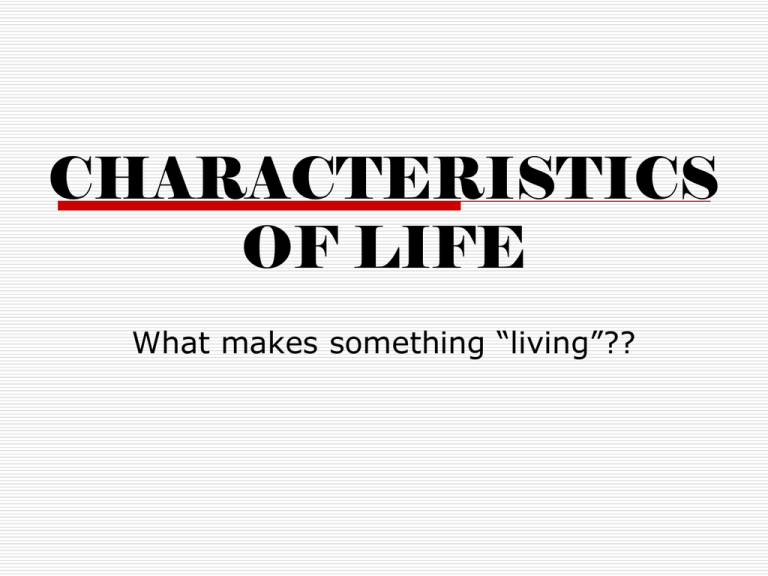
CHARACTERISTICS OF LIFE What makes something “living”?? What is Biology? The study of living things (organisms) The study of the interactions of living things bio = life Ology = study of What are the characteristics of life? There are 8 characteristics that all living things have in common. 1. Living things are made up of cells Unicellular Multicellular A cell is a collection of living material enclosed within a barrier Cells are the basic unit of life Unicellular: made up of one cell Multicellular: made up of many cells Asexual 2. Living Things Reproduce produce offspring which resemble parents Sexual asexual reproduction: has only one parent sexual reproduction: requires two parents 3. Living Things are based on a genetic code. Inheritance of traits is carried on through DNA 4. Living things Grow and Develop GROWTH: increase in size & shape DEVELOPMENT: mature over time Living things have a lifespan Growth Development 5. Living Things Use & Need Energy energy comes from food, used to maintain body AUTOTROPH: produce own food HETEROTROPH: must consume food DECOMPOSER: breaks down dead material for food 6. Living things respond to their surroundings They react to a stimulus which causes a reaction The reaction is called a response 7. Living things maintain a stable internal environment HOMEOSTASIS: internal balance Examples: sweating, panting, shivering, etc. 8. Living things Evolve Adapt to long-range changes in environment to better survive in their environment These changes take place over a long period of time & involve the entire species Quiz 2: The following are all examples of the characteristics of life. Identify each one. A. Adapt D. genetic code G. Respond to stimulus B. Made of cells E. Grow and develop H. Homeostasis C. Reproduce F. Use/need energy 1. You eat a hamburger for lunch. 2. A baby gains 3 pounds in one week and begins to recognize voices. 3. A polar bear has white fur to blend in with the snow. 4. Your start to cry whenever you get a shot at the doctor’s office. 5. You begin to shiver because it is cold outside. 6. Red and white particles make up part of your blood. 7. A chick breaks out of an egg. Quiz 2: The following are all examples of the characteristics of life. Identify each one. A. Adapt D. genetic code G. Respond to stimulus B. Made of cells E. Grow and develop H. Homeostasis C. Reproduce F. Use/need energy 1. You eat a hamburger for lunch. 2. A baby gains 3 pounds in one week and begins to recognize voices. 3. A polar bear has white fur to blend in with the snow. 4. Your start to cry whenever you get a shot at the doctor’s office. 5. You begin to shiver because it is cold outside. 6. Red and white particles make up part of your blood. 7. A chick breaks out of an egg. Quiz 2: The following are all examples of the characteristics of life. Identify each one. A. Adapt D. genetic code G. Respond to stimulus B. Made of cells E. Grow and develop H. Homeostasis C. Reproduce F. Use/need energy 1. You eat a hamburger for lunch. 2. A baby gains 3 pounds in one week and begins to recognize voices. 3. A polar bear has white fur to blend in with the snow. 4. Your start to cry whenever you get a shot at the doctor’s office. 5. You begin to shiver because it is cold outside. 6. Red and white particles make up part of your blood. 7. A chick breaks out of an egg. Quiz 2: The following are all examples of the characteristics of life. Identify each one. A. Adapt D. genetic code G. Respond to stimulus B. Made of cells E. Grow and develop H. Homeostasis C. Reproduce F. Use/need energy 1. You eat a hamburger for lunch. 2. A baby gains 3 pounds in one week and begins to recognize voices. 3. A polar bear has white fur to blend in with the snow. 4. Your start to cry whenever you get a shot at the doctor’s office. 5. You begin to shiver because it is cold outside. 6. Red and white particles make up part of your blood. 7. A chick breaks out of an egg.
